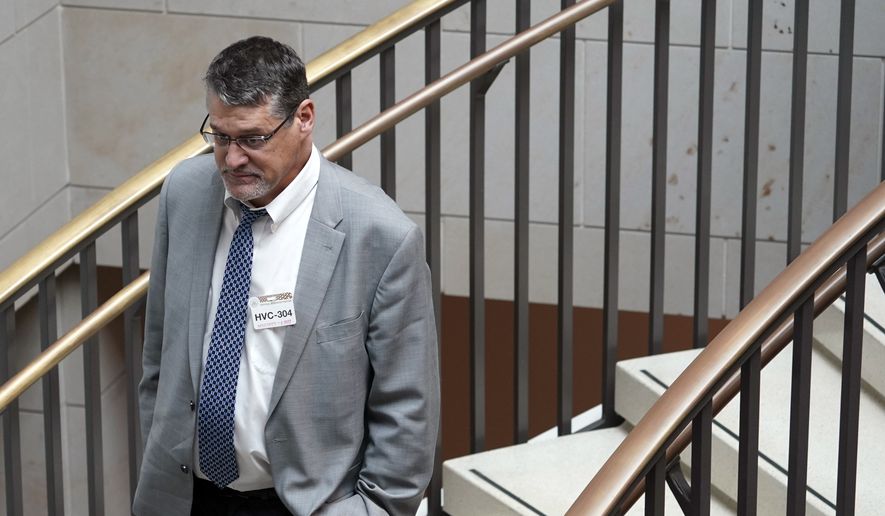Fusion GPS, the master of anonymous leaks to Washington’s media establishment, now is complaining about news leaks against it.
In a running court battle with House Intelligence Committee Chairman Devin Nunes, a Fusion lawyer and a company partner complained to U.S. District Judge Richard J. Leon that issues discussed in private have reached the press.
Mr. Nunes, California Republican, is investigating the opposition research firm’s role in trying to prove Trump-Russia collusion. He has signed subpoenas for Fusion’s bank records and wants more. One press leak was the identity of TD Bank.
“Now, I don’t have proof,” attorney Steven M. Salky of Zuckerman Spaeder told Judge Leon at a recent hearing. “I’m never going to be able to have proof, your honor, as to how Fox News got that information or how the Washington Examiner got the information from the bank, but I’m pretty confident that it wasn’t from Fusion or the bank.”
Glenn Simpson, a Fusion founder and former Wall Street Journal reporter, filed a declaration Tuesday.
Mr. Simpson, whose skill is persuading reporters to anonymously use his opposition research such as supposed dirt on President Trump, presented a timeline to suggest that only House Intelligence Committee Republicans could be doing the leaking.
He said he provided the bank name only to the staff of the Senate Judiciary Committee, which interviewed him last summer.
He acknowledged hiring Nellie H. Ohr, wife of Associate Deputy Attorney General Bruce Ohr, to work on the Trump dossier. He said her name, which leaked to Fox News, was contained in subpoenaed bank records.
Her job at Fusion was to “help our company with its research and analysis of Mr. Trump,” Mr. Simpson said.
He said he met with Mr. Ohr, at his request, after the election “to discuss our findings regarding Russia.” He said he provided that information Nov. 14 to the House committee.
“I am not aware of any other sources from which the committee or media could have learned of this information,” Mr. Simpson said.
Mr. Ohr had no formal role in the ongoing Trump-Russian probe, which since May has been conducted by special counsel Robert Mueller.
The leaks’ motive, said Mr. Salky: “There’s no real mystery here, your honor, that the leadership of this committee wishes to discredit Fusion and the work it did on the dossier They’re now looking for any Russian connections that they can use to discredit the work that Fusion did and to try to discredit Fusion. That’s the goal.”
Fusion is the liberal investigative firm stocked with former Wall Street Journal reporters who produced and distributed the Trump-Russia dossier. Its sensational charges against Mr. Trump and aides have not been proven publicly.
But the document has had such a political and investigative impact on Washington that Mr. Nunes set out to find out who funded it. Fusion is in court asking a judge to block further disclosures.
His subpoenas flushed out the fact that the Democratic National Committee and the Hillary Clinton campaign provided the money. The cash went from a law firm to Fusion to British ex-spy Christopher Steele. He then paid Kremlin sources for supposed dirt on the Trump team.
Mr. Simpson’s Dec. 12 court declaration did not mention Mr. Steele. The former spy met with Mr. Ohr during the election, but the motive for the meeting has not been disclosed publicly.
House Intelligence Committee Democrats have embraced the dossier. Rep. Adam Schiff of California, the ranking Democrat, extols Mr. Steele and his document. He calls Mr. Trump the worst president in modern history.
Mr. Nunes is demanding more Fusion information as the committee investigates Russian interference in the 2016 election. He wants financial data on other law firms from which Fusion receives money, as well as payments it has made to at least three journalists.
Mr. Salky argued that additional bank records are not pertinent to the committee probe. It “impinges upon Fusion’s First Amendment of free speech and associational rights Congress cannot, without any relevance or relationship to an investigation, simply roam around in a party’s private affairs,” he said.
Thomas G. Hungar, a House attorney, argued that when a party such as Fusion is “inextricably intertwined with the subject matter of the investigation, what investigators do is try and pursue leads.”
• Rowan Scarborough can be reached at rscarborough@washingtontimes.com.




Please read our comment policy before commenting.